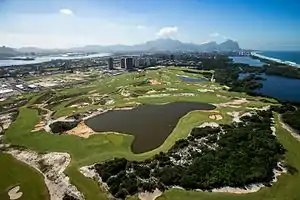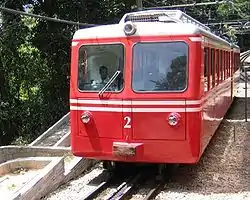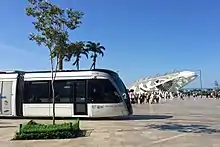Outline of Rio de Janeiro
The following outline is provided as an overview of and topical guide to Rio de Janeiro:
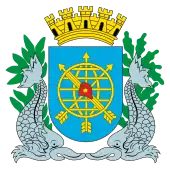
Rio de Janeiro – capital and most populous city of Rio de Janeiro state, and the second most populous city in Brazil, Rio de Janeiro was founded in 1565 by the Portuguese as part of the Portuguese Empire. It was the capital and political center of Brazil, where events like the Proclamation of the Republic took place. Brasília overtook Rio de Janeiro as the new capital of Brazil in 1960. Rio de Janeiro is known for its cultural riches, such as Carnival, samba and bossa nova, beaches such as Copacabana and Ipanema, and also for the Christ the Redeemer statue overlooking the city. Major education institutions include the Federal University of Rio de Janeiro, the Rio de Janeiro State University, and Colégio Pedro II.
General reference
- Pronunciation: /ˈriːoʊ di ʒəˈnɛəroʊ, - deɪ -, - də -/; Portuguese: [ˈʁi.u d(ʒi) ʒɐˈnejɾu];[1]
- Common English name(s): Rio de Janeiro
- Official English name(s): Rio de Janeiro
- Adjectival(s): Carioca
- Demonym(s): Carioca
Geography of Rio de Janeiro
- Rio de Janeiro is:
- a city
- capital of Rio de Janeiro (state)
- a city
- Population of Rio de Janeiro: 7,456,682
- Area of Rio de Janeiro: 1,221 km2 (486.5 sq mi)
Rio de Janeiro | |
|---|---|
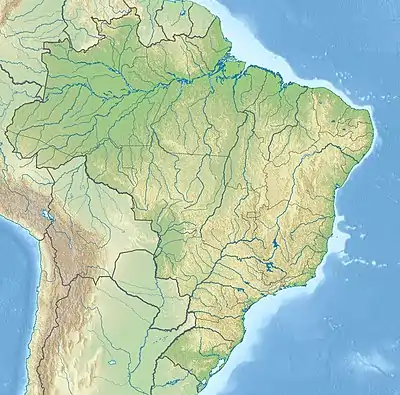 Rio de Janeiro Location within Brazil | |
| Coordinates: 22°54′30″S 43°11′47″W |
Location of Rio de Janeiro
Environment of Rio de Janeiro
Natural geographic features of Rio de Janeiro
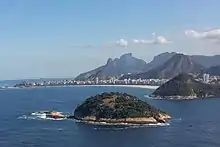
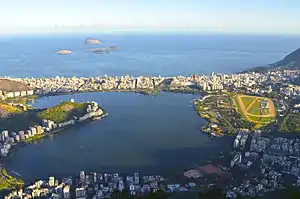
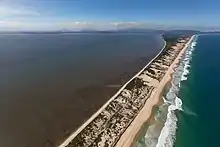
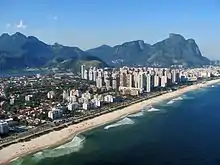
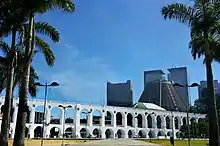
- Beaches in Rio de Janeiro
- Islands in Rio de Janeiro
- Lagoons in Rio de Janeiro
- Mountains in Rio de Janeiro
- Restingas in Rio de Janeiro
- Rivers in Rio de Janeiro
Areas of Rio de Janeiro
Neighbourhoods in Rio de Janeiro
Locations in Rio de Janeiro
- Tourist attractions in Rio de Janeiro
- Museums in Rio de Janeiro
- Shopping areas and markets
- World Heritage Sites in Rio de Janeiro
Aqueducts in Rio de Janeiro
Bridges in Rio de Janeiro
Cultural and exhibition centres in Rio de Janeiro
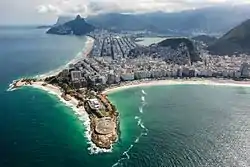
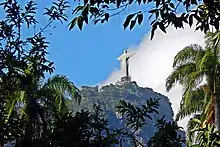
Forts in Rio de Janeiro
Monuments and memorials in Rio de Janeiro
Museums and art galleries in Rio de Janeiro
Museums in Rio de Janeiro
Palaces and villas in Rio de Janeiro
Parks and gardens in Rio de Janeiro
Public squares in Rio de Janeiro
Religious buildings in Rio de Janeiro
- Candelária Church
- Nossa Senhora do Monserrate do Rio de Janeiro
- Old Cathedral of Rio de Janeiro
- Presbyterian Cathedral of Rio de Janeiro
- Rio de Janeiro Cathedral
- Rio de Janeiro Brazil Temple
Secular buildings in Rio de Janeiro
Streets in Rio de Janeiro
Theatres in Rio de Janeiro
Demographics of Rio de Janeiro
Government and politics of Rio de Janeiro
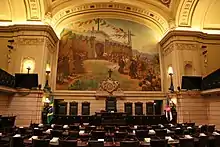
Politics of Rio de Janeiro
- Administrative Regions in Rio de Janeiro
- Mayors of Rio de Janeiro
- Municipal Chamber of Rio de Janeiro
- International relations of Rio de Janeiro
Law and order in Rio de Janeiro
- Law enforcement in Rio de Janeiro
History of Rio de Janeiro
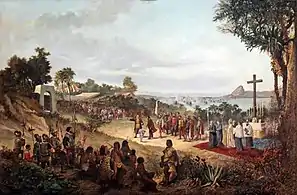
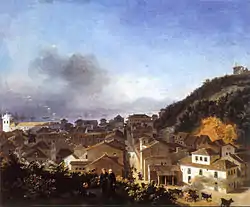
Carioca Square, Rio de Janeiro by Nicolas-Antoine Taunay. Museu Nacional de Belas Artes
History of Rio de Janeiro, by period or event
- Rio de Janeiro during the Portuguese Empire (1565–1815)
- São Sebastião do Rio de Janeiro founded by the Portuguese (1 March 1565)
- The colonial capital in Portuguese America is transferred to Rio de Janeiro from Salvador (27 January 1763)
- The city becomes capital of Kingdom of Portugal (1808)
- Rio de Janeiro during the United Kingdom of PBA (1815–1822)
- Rio becomes capital of the United Kingdom of Portugal, Brazil and the Algarves (1815)
- Rio de Janeiro during the Empire of Brazil (1822–1889)
- After the declaration of Brazil's independence in 1822, Rio de Janeiro becomes the capital of the new empire (1822–1889)
- Rio de Janeiro during the Republican period (1889–present)
- The city becomes capital of the republic of Brazil (1889)
- The Brazilian capital is officially moved to Brasília (21 April 1960)
- A presidential decree removes the city's federative status and merges it with the State of Rio de Janeiro, with the city of Rio de Janeiro replacing Niterói as the state's capital, and establishing the Rio de Janeiro Metropolitan Region (1975)
History of Rio de Janeiro, by subject
Culture of Rio de Janeiro

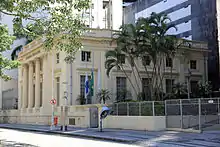
Architecture of Rio de Janeiro
Architecture in Rio de Janeiro
- Buildings in Rio de Janeiro
- Tallest buildings in Rio de Janeiro
Cinema of Rio de Janeiro
Literature of Rio de Janeiro
- Writers from Rio de Janeiro
Music of Rio de Janeiro
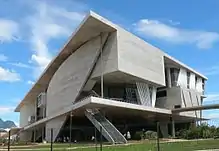
part.jpg.webp)
- Music festivals and competitions in Rio de Janeiro
- Music venues in Rio de Janeiro
- Musical ensembles in Rio de Janeiro
- Musicians from Rio de Janeiro
- Songs about Rio de Janeiro
- Dance from Rio de Janeiro
Theatre of Rio de Janeiro
Visual arts of Rio de Janeiro
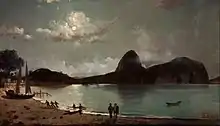
.jpg.webp)
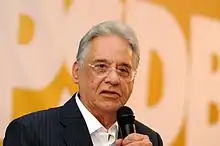
Rio de Janeiro in art / Paintings of Rio de Janeiro
Art in Rio de Janeiro
- Imperial Academy of Fine Arts
- Escola Nacional de Belas Artes
- Public art in Rio de Janeiro
Events in Rio de Janeiro
Festivals in Rio de Janeiro
Languages of Rio de Janeiro
Media in Rio de Janeiro
- Newspapers in Rio de Janeiro
- Radio and television in Rio de Janeiro
People from Rio de Janeiro
Religion in Rio de Janeiro
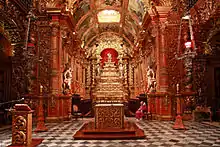
| Religion | Percentage | Number |
| Catholic | 51.09% | 3,229,192 |
| Protestant | 23.37% | 1,477,021 |
| Irreligious | 13.59% | 858,704 |
| Spiritist | 5.90% | 372,851 |
| Umbanda and Candomblé | 1.29% | 72,946 |
| Jewish | 0.34% | 21,800 |
| Source: IBGE 2010.[2] | ||
Sports in Rio de Janeiro
.jpg.webp)
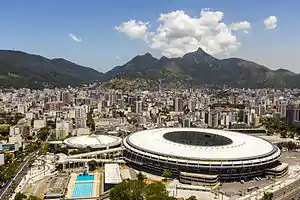
- Football in Rio de Janeiro
- Sports competitions in Rio de Janeiro
- Sports venues in Rio de Janeiro
Economy and infrastructure of Rio de Janeiro
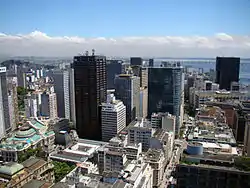
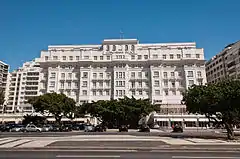
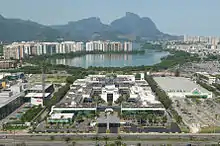
- Communications in Rio de Janeiro
- Financial services in Rio de Janeiro
- Hotels and resorts in Rio de Janeiro
- Shopping malls and markets in Rio de Janeiro
- Tourism in Rio de Janeiro
- Tourist attractions in Rio de Janeiro
Transportation in Rio de Janeiro
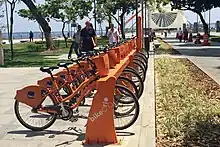
Public transport in Rio de Janeiro
- Air transport in Rio de Janeiro
- Airports in Rio de Janeiro
- Cable transport in Rio de Janeiro
- Maritime transport in Rio de Janeiro
- Road transport in Rio de Janeiro
Rail transport in Rio de Janeiro
Rail transport in Rio de Janeiro
- Corcovado Rack Railway
- Railway stations in Rio de Janeiro
 Rio de Janeiro Metro
Rio de Janeiro Metro
- SuperVia
- Trams in Rio de Janeiro
Education in Rio de Janeiro
- List of Rio de Janeiro schools, colleges, universities and research centers
- Universities and colleges in Rio de Janeiro
- Research institutes in Rio de Janeiro
See also
References
- It is pronounced [ˈʁi.u d(ʒi) ʒaˈnejɾu] in the variety of Brazilian Portuguese spoken in Rio de Janeiro according to Larousse Concise Dictionary: Portuguese-English, 2008, p. 339. Vowel reduction at /a ~ ɐ/ was added as it is the most often used speech pattern in vernacular, colloquial and educated colloquial modes of speech. [ˈʁi.u dʑi ʑəˈnejɾu] is possibly the way most Brazilians, and particularly most cariocas, would actually pronounce it. The European Portuguese pronunciation is: [ˈʁi.u ðɨ ʒɐˈnɐjɾu].
- "Sistema IBGE de Recuperação Automática — SIDRA". Sidra.ibge.gov.br. Retrieved 11 October 2012.
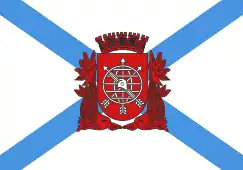

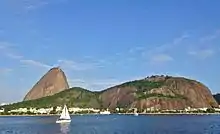
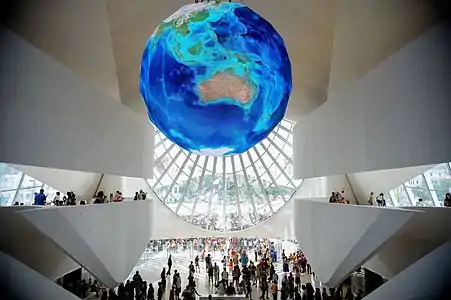
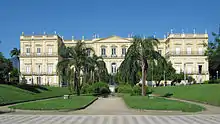
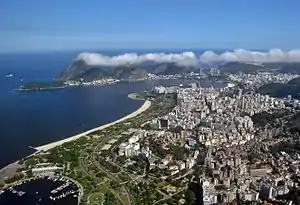

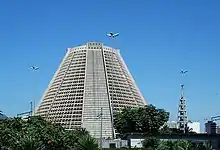
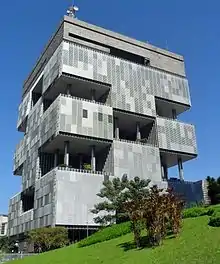
.jpg.webp)
